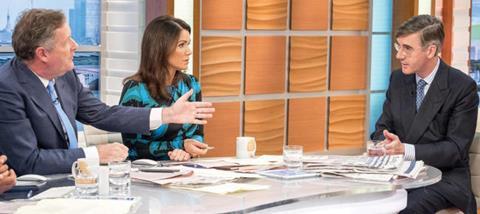
Like many Christians, I was delighted to see Jacob Rees-Mogg, the Conservative MP for North-East Somerset, witness to his principles and his faith on ITV’s Good Morning Britain (GMB). Going on the show and being asked by Piers Morgan what he thought about marriage and abortion – inevitable questions for such a public Christian – he said “I’m completely opposed to abortion” and on gay marriage stated, “I support the teaching of the Catholic Church”.
It wasn’t merely that Rees-Mogg defended Christian teaching on homosexuality and abortion, a rarity enough on mainstream television, but that he did so with both firm confidence and gentle compassion. He maintained his convictions in the teeth of the dominant and irrational group-think of the political and media establishment, making clear that he did not want to judge any individual, but that he maintained, as a conscientious MP voting in free votes in Parliament, the integrity of his Christian belief.
This witness is valuable, and in marked contrast to the eventual capitulation of Tim Farron on the same issues. We are fortunate that at least one Member of Parliament has the courage, and balanced intelligence, to be able to show real Christian faithfulness.
Partly, as Rees-Mogg pointed out, this is because Farron was leader of the Liberal Democrats, and what the Farron episode showed (as with so many others increasingly in our culture) is that the Centre-Left of politics is incredibly illiberal and ironically bigoted in its intolerance to anyone with Christian views on sex or the right to life.
Yet we see that this bias extends now to all of politics and public life. What the GMB presenters gave to Rees-Mogg was the secular litmus test of two subjects – abortion and homosexuality – that our political and media elite now insist we must have permissive views on in order to be accepted as having a valid voice in the public sphere.
The Times newspaper claimed that Rees-Mogg’s “views on abortion and gay marriage are out of kilter with modern Britain and the mainstream of the Conservative Party”. What they are actually inconsistent with is not “modern Britain”, but with the so-called ‘liberal’ elite at newspapers like The Times who claim to talk for the country, yet only really speak for the socially permissive bubble of people living and working in parts of central London.
It’s not since Catholics like Rees-Mogg and myself were subject to the discrimination of the Test Acts of the 17th to 19th centuries that being a practising and orthodox member of the faith has been so apparently exclusionary of the prospect of holding public office. That Rees-Mogg is willing to contradict this is profoundly encouraging.
The strength of Rees-Mogg is his unapologetic authenticity, something appreciated and admired in our postmodern culture. All Christians would do well to learn from his courage.
For more opinion on the latest trends, topics, news and culture from a Christian perspective, visit premierchristianity.com/blog



























